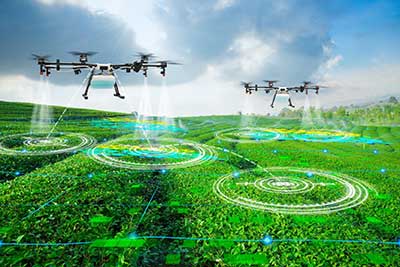Date : 10/08/2023
Relevance: GS Paper 3 - Agriculture
Keywords: National Seeds Corporation, Protection of Plant Varieties & Farmers Rights Act, 2001, Sustainable Development Goals (SDGs), Clean Green Mission
Context-
- While India has made remarkable strides in achieving food security with substantial foodgrain production, there persists a significant gap in meeting the demand for coarse cereals, pulses, oilseeds, and vegetables.
- This gap leads to issues of malnourishment, especially among the vulnerable population, highlighting the need for improved agricultural practices. Emphasizing the importance of quality seeds and leveraging new technologies,
The Evolution of India's Seed Industry:
- The foundation of India's seed industry was laid in the 1960s with the establishment of the National Seeds Corporation and was further bolstered by favorable policies and regulatory support. Significant milestones, such as the Protection of Plant Varieties & Farmers Rights Act, 2001, and the introduction of Bt cotton hybrids, marked a shift towards a technology-driven seed sector.
- This transformation played a pivotal role in enhancing agricultural productivity and meeting the challenges posed by climate change.
Mitigating Climate Change Threats:
Climate change, coupled with resource depletion and natural disasters, poses formidable challenges to Indian agriculture, largely sustained by smallholder farmers. India's progress toward achieving Sustainable Development Goals (SDGs), particularly those linked to agriculture and nutrition, necessitates the effective utilization of available technologies, including traditional agricultural knowledge
The Potential of Millets:
- Millets, renowned for their nutrient richness and adaptability, emerge as a promising solution for sustainable agriculture. As a global leader in millet production, India possesses the capability to capitalize on this crop's potential by producing quality-assured seeds of improved varieties.
- The combination of genetic advancements and applied technologies can amplify seed availability and quality, enabling crops to thrive under diverse conditions and stressors.
Seed Technology: Enhancing Quality and Performance:
- Seed technology has evolved to encompass genetic manipulation, priming, film coating, seed treatments with biologicals, and more. These technologies not only enhance seed quality but also equip seeds to withstand various biotic and abiotic stressors.
- By incorporating pest control measures through film coating and other innovative methods, seed technology contributes to higher germination rates and vigorous seedling growth.
Cost Considerations and Sustainability:
- While the cost of seeds constitutes a fraction of total production expenses, their impact on yield and profitability is substantial. Quality-assured seeds of improved varieties can yield advantages of up to 15-20 percent over their genetic potential. The shift away from farm-saved seeds towards quality-assured seeds signifies farmers' recognition of the benefits.
- Sustainable seed technologies, facilitated through research and development efforts from both the public and private sectors, can further optimize planting value and crop performance.
Synergy Between Public and Private Sectors:
- The synergy between the public and private sectors is paramount in creating sustainable seed technologies. Genetic manipulation, priming, film coating, and incorporation of AI-responsive sensors and substances are among the emerging technologies.
- Regulatory support, exemplified by the inclusion of bio-stimulants in the Fertilizer (Inorganic, Organic, or Mixed) (Control) Amendment Order, 2021, paves the way for broader adoption of seed-enhancement practices.
Regulatory Mechanisms: Paving the Path Forward:
- The success of these innovations hinges on supportive regulatory guidelines. Inclusivity of coated/pelleted seed under the Certified Seed (CS) category and the formulation of guidelines for AI-based responses from seeds under specific conditions are vital steps. Such measures can significantly reduce pesticide load, dust-off, and overall environmental impact.
- The integration of seed technology into mainstream agriculture requires robust regulatory mechanisms to ensure quality seedlings and planting materials. Initiatives like the proposed Clean Green Mission by the Government of India provide a platform to regulate and promote sustainable seed technologies. By harmonizing scientific validation with enabling regulatory frameworks, India can harness the advantages of advanced seed technologies to advance sustainable agriculture.
Conclusion:
In the pursuit of closing the yield gap, promoting food security, and addressing malnutrition, harnessing the potential of advanced seed technology is paramount. Leveraging genetic advancements, innovative treatments, and regulatory support, India can pave the way for sustainable agriculture. By focusing on enhancing seed quality and performance, the nation can fortify its agricultural resilience, empower farmers, and ensure a prosperous and secure future for its population.
Probable Questions for UPSC Main exam-
- Explain the evolution of India's seed industry and its significance in achieving sustainable agriculture. Highlight the role of technological advancements and regulatory support in transforming the sector. (10 Marks, 150 Words)
- Discuss the potential of millets in promoting sustainable agriculture in India. How can seed technology contribute to maximizing the benefits of millet cultivation? Explain the various seed enhancement technologies and their role in improving seed quality and performance (15 Marks, 250 Words)
Source : The Hindu







